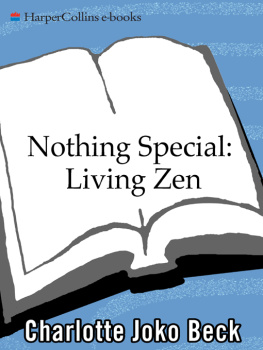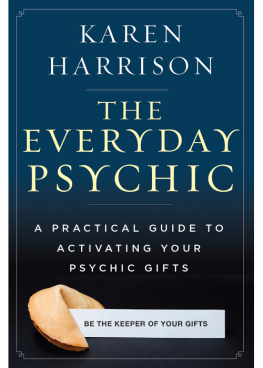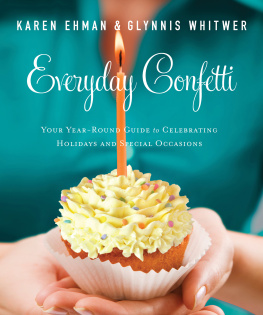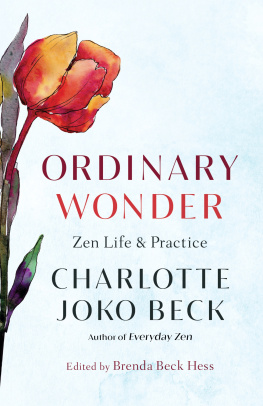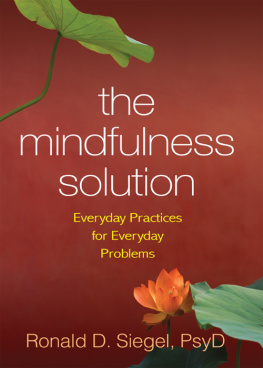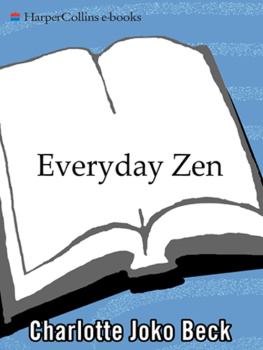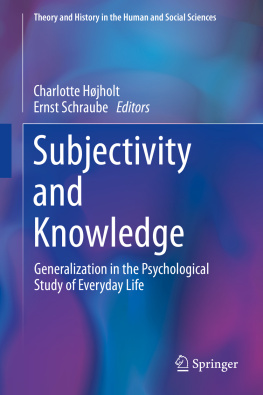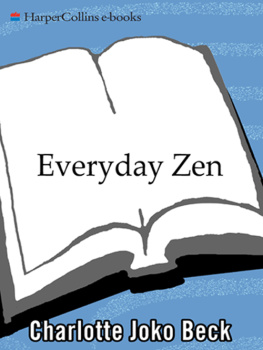Beck Charlotte J. - Nothing Special
Here you can read online Beck Charlotte J. - Nothing Special full text of the book (entire story) in english for free. Download pdf and epub, get meaning, cover and reviews about this ebook. year: 2014, publisher: HarperCollins e-Books, genre: Religion. Description of the work, (preface) as well as reviews are available. Best literature library LitArk.com created for fans of good reading and offers a wide selection of genres:
Romance novel
Science fiction
Adventure
Detective
Science
History
Home and family
Prose
Art
Politics
Computer
Non-fiction
Religion
Business
Children
Humor
Choose a favorite category and find really read worthwhile books. Enjoy immersion in the world of imagination, feel the emotions of the characters or learn something new for yourself, make an fascinating discovery.
- Book:Nothing Special
- Author:
- Publisher:HarperCollins e-Books
- Genre:
- Year:2014
- Rating:5 / 5
- Favourites:Add to favourites
- Your mark:
- 100
- 1
- 2
- 3
- 4
- 5
Nothing Special: summary, description and annotation
We offer to read an annotation, description, summary or preface (depends on what the author of the book "Nothing Special" wrote himself). If you haven't found the necessary information about the book — write in the comments, we will try to find it.
Nothing Special — read online for free the complete book (whole text) full work
Below is the text of the book, divided by pages. System saving the place of the last page read, allows you to conveniently read the book "Nothing Special" online for free, without having to search again every time where you left off. Put a bookmark, and you can go to the page where you finished reading at any time.
Font size:
Interval:
Bookmark:
Living Zen
Edited by Steve Smith

Zen is not some fancy, special art of living. Our teaching is just to live, always in reality, in its exact sense.
Shunryu Suzuki,
Zen Mind, Beginners Mind
Struggle
Sacrifice
Separation and Connection
Change
Awareness
Freedom
Wonder
Nothing Special
Living Zen is nothing special: life as it is. Zen is life itself, nothing added. Put no head above your own, declared Master Rinzai. When we seek from Zen (or from any spiritual path) the fulfillment of our fantasies, we separate from the earth and sky, from our loved ones, from our aching backs and hearts, from the very soles of our feet. Such fantasies insulate us for a time; yet in ten thousand ways reality intrudes, and our lives become anxious scurrying, quiet desperation, confusing melodrama. Distracted and obsessed, striving for something special, we seek another place and time: not here, not now, not this. Anything but this ordinary life, thisnothing special.
Living Zen means reversing our flight from nothingness, opening to the emptiness of here and now. Slowly, painfully, we reconcile to life. The heart sinks; hope dies. Things are always just as they are, observes Joko. This empty tautology is no counsel of despair, however, but an invitation to joy. Dying to ego-dreams, no longer straining for effect, we return to a simple mind. In the garden of everyday experience, we uncover unexpected treasures. Ingenuous, living from what we are, we move from a self-centered toward a reality-centered lifeand open to wonder. Abandoning magical thought, awakening to the magic of this moment, we realize in dynamic emptiness the grace of nothing specialliving Zen.
In her life and teaching, in her very presence, Joko Beck manifests the remarkable absence that is living Zen. As Lenore Friedman observes, In her absolute plainness, Joko embodies the Zen quality of Nothing Special. She is simply there, in each bare moment.thought has touched a resonant chord in countless readers around the world. Everyday Zen: Love and Work brought the insights of Zen to ordinary life in a form that is attuned to the rhythms of contemporary Western experience. Nothing Special: Living Zen extends and enlarges Jokos teaching. Its heightened maturity and closer attention to actual practice make this book useful not only for those who wish better understanding of Zen in the West, but also for those who are determined to transform their lives.
Like its predecessor, this book is the fruit not only of Jokos thought, but also of generous support from many of her devoted students and friends. Some will find talks here that they first transcribed or suggested for inclusion. Without their help, the book might not have come into being. John Loudon, senior editor at HarperSanFrancisco, guided the project with encouragement and wisdom. I am grateful for his stewardship and good judgment. Few authors and editors can be more fortunate than I in their secretarial support: with unflagging good humor, Pat Padilla has worked quickly and accurately with my often messy revisions. Once again, collaborating with Joko has been the greatest joy of all. Through compassion seasoned by wisdom, she continues to serve every life she touches.
Steve Smith
Claremont, California
February 1993
We are rather like whirlpools in the river of life. In flowing forward, a river or stream may hit rocks, branches, or irregularities in the ground, causing whirlpools to spring up spontaneously here and there. Water entering one whirlpool quickly passes through and rejoins the river, eventually joining another whirlpool and moving on. Though for short periods it seems to be distinguishable as a separate event, the water in the whirlpools is just the river itself. The stability of a whirlpool is only temporary. The energy of the river of life forms living thingsa human being, a cat or dog, trees and plantsthen what held the whirlpool in place is itself altered, and the whirlpool is swept away, reentering the larger flow. The energy that was a particular whirlpool fades out and the water passes on, perhaps to be caught again and turned for a moment into another whirlpool.
Wed rather not think of our lives in this way, however. We dont want to see ourselves as simply a temporary formation, a whirlpool in the river of life. The fact is, we take form for a while; then when conditions are appropriate, we fade out. Theres nothing wrong with fading out; its a natural part of the process. However, we want to think that this little whirlpool that we are isnt part of the stream. We want to see ourselves as permanent and stable. Our whole energy goes into trying to protect our supposed separateness. To protect the separateness, we set up artificial, fixed boundaries; as a consequence, we accumulate excess baggage, stuff that slips into our whirlpool and cant flow out again. So things clog up our whirlpool and the process gets messy. The stream needs to flow naturally and freely. If our particular whirlpool is all bogged down, we also impair the energy of the stream itself. It cant go anywhere. Neighboring whirlpools may get less water because of our frantic holding on. What we can best do for ourselves and for life is to keep the water in our whirlpool rushing and clear so that it is just flowing in and flowing out. When it gets all clogged up, we create troublesmental, physical, spiritual.
We serve other whirlpools best if the water that enters ours is free to rush through and move on easily and quickly to whatever else needs to be stirred. The energy of life seeks rapid transformation. If we can see life this way and not cling to anything, life simply comes and goes. When debris flows into our little whirlpool, if the flow is even and strong, the debris rushes around for a while and then goes on its way. Yet thats not how we live our lives. Not seeing that we are simply a whirlpool in the river of the universe, we view ourselves as separate entities, needing to protect our boundaries. The very judgment I feel hurt establishes a boundary, by naming an I that demands to be protected. Whenever trash floats into our whirlpool, we make great efforts to avoid it, to expel it, or to somehow control it.
Ninety percent of a typical human life is spent trying to put boundaries around the whirlpool. Were constantly on guard: He might hurt me. This might go wrong. I dont like him anyway. This is a complete misuse of our life function; yet we all do it to some degree.
Financial worries reflect our struggle to maintain fixed boundaries. What if my investment doesnt work out? I might lose all of my money. We dont want anything to threaten our money supply. We all think that would be a terrible thing. By being protective and anxious, clinging to our assets, we clog up our lives. Water that should be rushing in and out, so it can serve, becomes stagnant. A whirlpool that puts up a dam around itself and shuts itself off from the river becomes stagnant and loses its vitality. Practice is about no longer being caught in the particular, and instead seeing it for what it isa part of the whole. Yet we spend most of our energies creating stagnant water. Thats what living in fear will do. The fear exists because the whirlpool doesnt understand what it isnone other than the stream itself. Until we get an inkling of that truth, all of our energies go in the wrong direction. We create many stagnant pools, which breed contamination and disease. Pools seeking to dam themselves for protection begin to contend with one another. Youre smelly. I dont like you. Stagnant pools cause a lot of trouble. The freshness of life is gone.
Font size:
Interval:
Bookmark:
Similar books «Nothing Special»
Look at similar books to Nothing Special. We have selected literature similar in name and meaning in the hope of providing readers with more options to find new, interesting, not yet read works.
Discussion, reviews of the book Nothing Special and just readers' own opinions. Leave your comments, write what you think about the work, its meaning or the main characters. Specify what exactly you liked and what you didn't like, and why you think so.

